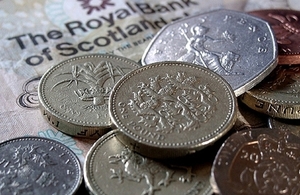Danny Alexander: the pound question
Chief Secretary to the Treasury responds to the Scotland Decides TV debate on the independence referendum, and the question of currency.

Pound coins along with Scottish bank note
This article by Danny Alexander first appeared in the Scotsman on Wednesday 6 August 2014.
“WHAT’S your country’s currency?” It’s a pretty simple question that, as Alistair Darling rightly said, every school kid should be able to answer. Yet the First Minister cannot tell us what his plan for our country’s currency would be should Scotland vote to become a separate state on 18 September.
To me that’s the single most important message from the TV debate on the Scottish referendum. The issue of the currency is fundamental to Scotland’s future economic success. But Alex Salmond is just closing his eyes and hoping reality will go away.
He says he wants a currency union with the rest of the UK, but he seems to have forgotten that the word “union” means there has to be agreement between the various countries involved. The truth is that the rest of the UK will not want to enter into a currency union and the Scottish Government will not be able to impose it unilaterally.
This is not out of spite or malice. As so many independent experts have pointed out, there are good reasons why a currency union would not be in the interests of Scotland or the UK. First of all, a currency union would be too one-sided. The combined economy of England, Wales and Northern Ireland is ten times the size of the Scottish economy.
What’s more, a separate Scotland’s banking sector would be too large, creating hugely imbalanced financial sector risks between us and the rest of the UK. All of this means that while UK taxpayers might have to bail out the Scottish government, the reverse would not be remotely possible. As we’ve seen in the euro area, currency unions do not work without a full political, economic and fiscal union, which, of course, is precisely what we have at the moment as part of the UK and what the nationalists want to dissolve.
Second, currency unions only work with a cast-iron assurance that they are forever. Look at any sterling bank note and you will see a “promise to pay” the bearer. Given that the Scottish Government’s white paper says that they may choose a completely different currency arrangement in the future, it seems to me that the nationalist “promises” are totally non-credible.
Third, control. If we are to embark on the difficult journey of setting up a new state, we will want to have all the economic powers possible. But a currency union would mean we couldn’t set our own interest rates, tax and spending levels. That’s why a currency union would also be the wrong choice for Scotland. It is for these reasons that the three main UK political parties have explicitly ruled out a currency union. It is not in anyone’s interest and people in the UK would not accept it. That is why the First Minister needs to come clean about his plan B for the currency.
The studio audience was right to boo his failure to answer this basic question, because it is fundamental to what independence might mean. In theory, a separate Scotland could use the pound or any other foreign currency without a formal agreement, in what’s known as “sterlingisation”. This is the sort of thing that small countries like Panama and Montenegro do. It is what Alex Salmond has hinted at for his plan B, but refuses to confirm.
That’s because it has huge risks: it would mean Scotland would not have a central bank to set interest rates or protect financial institutions and pension providers from market instability. Apart from creating a whole new currency, the only other option left for Alex Salmond is for Scotland to join the euro, but he now seems to have ruled that out.
The people of Scotland deserve an answer on the currency. All they are getting from the First Minister is unanswered questions, uncertainty and misinformation. No one should vote for independence on the basis that we will keep the pound as it is now – we won’t. Scotland deserves a better response to that fact than the bluff and bluster we got from Alex Salmond.
Danny Alexander is Chief Secretary to the Treasury